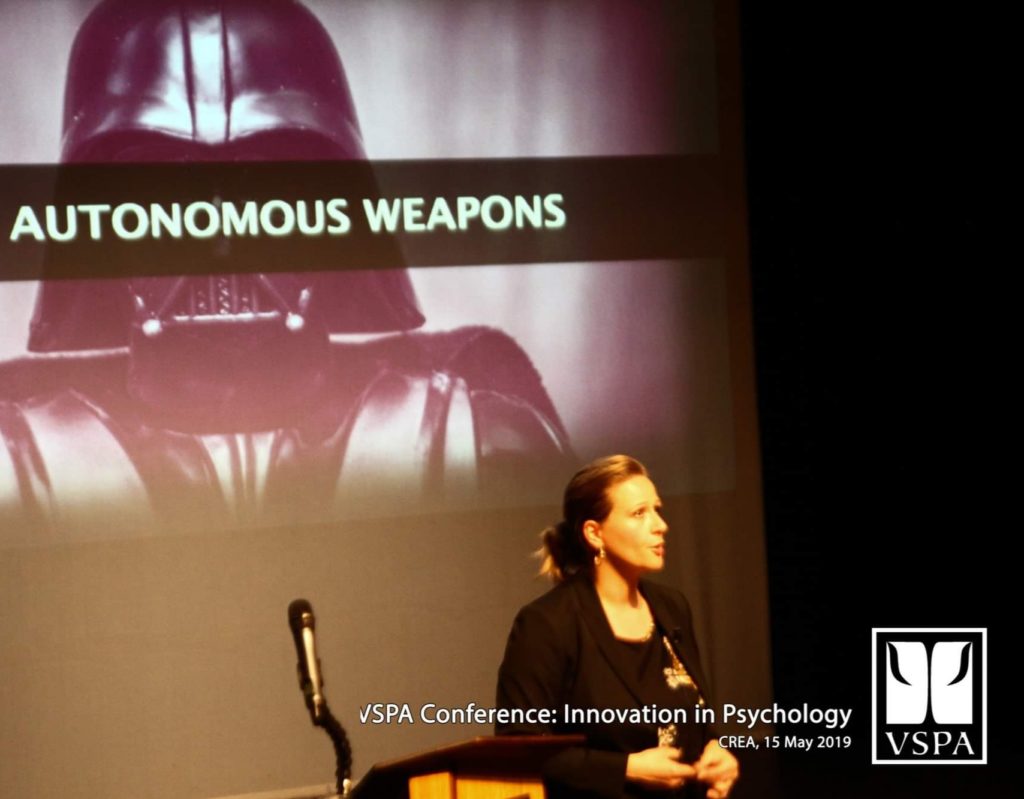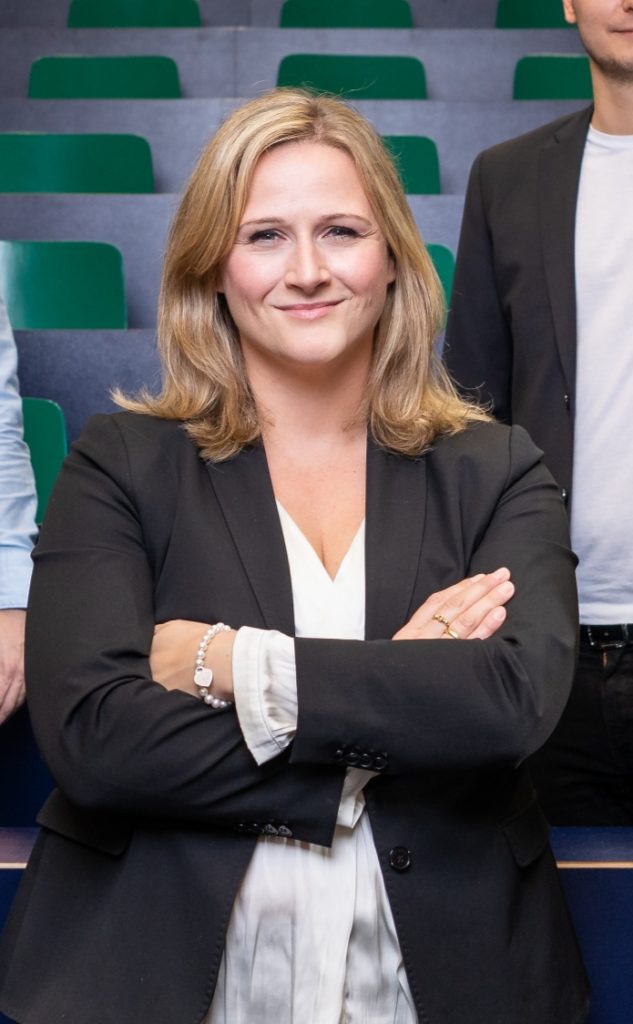We are very honored to have Marisa Tschopp as our first guest. Marisa is a researcher at scip AG, a cybersecurity and tech company in Zurich. What does it take to trust AI? How will AI change leadership behaviour? How smart is Siri ? Why ban lethal autonomous weapons systems ? These are some of the questions that lead her research.

Marisa is also the Swiss Ambassador for Women in AI, whose mission is to increase female representation and participation in AI.
As an organizational psychologist, she is interested in understanding the fascination around AI, as she explained in a TED Talk, and what impact it will have on our lives. As a mother of two, she wants to know how AI will affect the future of her children and help them be in control.
Marisa has become a big fan of science communication ever since she first experienced a science slam. She is keen to share her work about AI. Despite her many achievements and qualifications, she sometimes suffered from the impostor syndrome. We asked her a few questions and guess what? She’s not an impostor but a researcher who truly loves her job and grandly contributes to the AI field. Please get into her story :
How did you become a scientist?
Very good question. Actually, I hated school. I never thought that I would become a scientist or a researcher. After my maturity diploma in Germany, I thought I would never go to school again. I worked in some other jobs and at one point I realized that I was really into psychology and philosophy – understanding people, what they do and why they do it. Let’s do a bachelor, I said to myself at one point – let’s do something applied like business psychology. When I started my bachelor, I finally studied something I really enjoyed. It was like a blossom – a wow moment. I enjoyed learning, I had found something I am good at. That was in a University of applied sciences. Then I went to another University and did a master degree there. I was a very good student – but still, I wanted to go into management, especially high school management. After a few years, I was missing something. I wanted to work with content.
I understood that research and working with content and books and numbers could be a natural job.
I found a job opening, a position as a corporate researcher. It was basically a blueprint, I was free to write my own job description, what I wanted to do. To be honest, I am going to work everyday with a smile. It’s fantastic. Today, my husband is taking care of the kids and I’m just like yeah – I am so happy to work today! (laughs). [Editor’s note: written during the COVID-19 crisis).]
How does your research contribute to society?

I chose this intersection of psychology and AI because I was always fascinated with digital technologies and social networks. I am not so much interested in how they work and what they do but extremely fascinated by their impact on human lives and interactions. For example, how does Facebook change how I interact with my friends in real life and how I react and feel? I have been seeing a lot of good things about new technologies but also a lot of downsides. It triggered me and I wanted to understand more of it.
I have two kids, and want to know how tech will impact our and their life.
How can I be sure we are using tech for the better? I am trying to put my work out there and share my knowledge with people who do not have the time to investigate. This is important, so let’s do something about it.
Any personal experience?
I observe that women tend to lack confidence when it comes to financial negotiations, such as salary negotiations. Women will be more prone to give talks for free and buy in the organizers’ argument that they will gain visibility. Well it is ok for once or twice or at the beginning of your career. Now, I have a straightforward policy. For NGOs and nonprofit I have free or special conditions. But for all commercial events and conferences, I stick to my feets. Women should figure out what their own value is. With many experts in the field, this is a huge problem. Institutions may be prestigious and good to have on your CV.
However, everyone, and women in particular, should be clear on their own values. This is a problem I see a lot.
What is, in your view, the role of public relations in supporting science and how do you use them in your own strategy?
I have become a great fan of science communication. I wish I would have learned something like this in my studies, but there was nothing of the sort. It is extremely important. I see this now with this Coronavirus crisis, how the epidemiologists – if they are able to deliver good science communication – like Marcel Salathé at EPFL – how this is actually lifesaving.
Everybody should be able to express complex concepts in simple terms.
However, there must be a lot of substance beneath it. You have to understand your research and concepts very well to be able to translate them in simple terms. Some researchers think that any research that can be explained in simple terms is not complex enough– I have heard that opinion. I think that being able to publicly share your science is really important. Research is also conducted to tell other people how important this [editors’ note: AI in this context] is. If you speak only about things that nobody understands, then nobody cares.
Should you encourage young girls to step into science, what would you say?
One should start with a vision, in terms of what are you able to do when you understand algebra, statistics or coding for example. One way to spark enthusiasm and a vision could be, let’s say, a drone or a robot. Girls always want to know how they can do good. Start with a case when drones are used to bring medicines and things to areas that are hard to reach. “Start with a why” like as would say Simon Sinek. Then they get that the vision is cool, but they also get that they have to understand a little bit how the technology works or how they can code stuff. This is something I have missed in my education, I did not see any long-term goals, I was just learning stuff. For example, I love robotics, in my next life I will definitely go into robotics [laughs].
I think girls need role models and coaching, especially those whose parents are not into science.
People who can give tips on how to study, what’s the university like. They need role models and a vision.
Is there something you would do differently or advise young scientists to avoid doing?
I wouldn’t have done anything differently because my whole journey brought me to where I am today, and things would have been framed differently.
However, if I had known before, I could advise my younger self at 19-20 to join networks, including women networks – they constitute some sort of safe environment with women who share similar challenges.
I would have done this earlier, and learnt sooner, for example, that I can study and work and take some professional coaching all at the same time. I would have tried to have as many opinions as possible.
An anecdote to share with us about your journey as a woman, a woman in science, a leader?
I believe that, being a woman, I have been given preference many times. Actually, nowadays, you are given more preference than anything else if you are a woman, a little bit of scientist and in the AI field (laughs). You are good to go.
There is no better time as a woman to go in science and tech.
I’ve heard a lot of harassment stories but never experienced any of this. My company is completely supportive, I manage my research with freedom. Moreover, institutions like EPFL are so supportive, they are working hard to have gender equity in conferences. I have never experienced negative things. Of course I have been and still am the only woman on a conference panel and I do dream of a 50/50 representation. Yet, I guess panel full of women are no better than panel full of men. I am comfortable with human kind, women, men.
Serious question, asking for opinions/ advice.
All-Male panels (#manels) are not ok, but are All-Female panels ok?
I have a bias in my network, that there tends to be a celebration for all-female panels in the tech field, which I have trouble understanding. #diversity #sgd5 pic.twitter.com/aIPHbxATL0
— Marisa Tschopp (@MarisaTPP) March 25, 2020
Short Bio

Marisa Tschopp is a researcher at scip ag, a cybersecurity and tech company in Zurich. She is conducting research about AI and technology from a psychological perspective, with a wide range of questions related to psychological phenomena, governance and ethical implications. Her research areas are about trust (What does it take to trust AI?), behavioural performance measurement of conversational AI (How smart is Siri?), and lethal autonomous weapons system (killerrobots and how to ban them!). As an organizational psychologist she has experience in social and educational institutions with specific passion for digital teaching-learning trends, and has been teaching in several higher education institutions in Germany and Switzerland. She published various media articles, books, and papers and is a frequent speaker on conferences and events worldwide. Marisa holds a Master’s degree in Psychology of Excellence in Business and Education from the Ludwig-Maximilians-University of Munich, Germany as well as a BA business degree, focusing on market and consumer psychology.
Follow her research and news :


